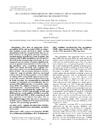Identificador persistente para citar o vincular este elemento:
https://accedacris.ulpgc.es/jspui/handle/10553/565
| Título: | Influence of polyamines on the sporulation of Grateloupia (Halymeniaceae, Rhodophyta) | Autores/as: | Sacramento Trujillo, Alicia García-Jiménez, Pilar Alcázar, Rubén Tiburcio, Antonio F. Robaina, Rafael R. |
Palabras clave: | Poliaminas | Fecha de publicación: | 2004 | Proyectos: | Mecanismos Moleculares Responsables de Los Efectos de Las Poliaminas Sobre la Reproduccion y El Estres Salino en Macroalgas PI2001/129 (Gobierno de las Islas Canarias) INNOVA (Fundación Universitaria de Las Palmas de Gran Canaria) |
Publicación seriada: | Journal of Phycology | Resumen: | Polyamines (PAs) such as putrescine (PUT), spermidine (SPD), and spermine (SPM) are ubiquitous aliphatic amines involved in widely varying physiological behavior, but particularly they are actively involved in cell growth, division, and differentiation during reproductive events in plants. The contents of PUT, SPD, and SPM in infertile and fertile thalli of the red macroalga Grateloupia sp. were compared, and the results revealed a significant decrease in quantity from infertile to fertile status. At the enzymatic level, L-ornithine decarboxylase (ODC) was mainly detected, and L-arginine decarboxylase activity was not diminished by the inhibition of ODC. The maximum enzymatic activities, within the range of activities observed, correlated with the lower levels of polyamines in fertile thalli. In culture, SPM promoted the maturation of cystocarps to the eventual liberation of spores from aseptic fertile explants. PAs accumulated in cultivated explants as compared with noncultivated, but exogenous SPM addition further increased the endogenous SPM. The addition of berenyl, cordycepin, cyclohexylamine, dicyclohexylamine, and aurintricarboxylic acid blocked the synthesis in culture at the level of PUT, and partially at SPD and SPM synthesis, but the addition of SPM restored the levels of SPD and SPM as SPM accumulated, and they appeared to interconvert each other. The results obtained suggest that the culture in presence of SPM restored a deficient SPM situation in fertile explants, thus promoting sporulation. | URI: | https://accedacris.ulpgc.es/handle/10553/565 | ISSN: | 0022-3646 | DOI: | 10.1111/j.1529-8817.2004.03183.x | Fuente: | Journal of Phycology[ISSN 0022-3646],v. 40, p. 887-894 |
| Colección: | Artículos |
Citas SCOPUSTM
36
actualizado el 08-jun-2025
Citas de WEB OF SCIENCETM
Citations
30
actualizado el 22-feb-2026
Visitas
294
actualizado el 15-ene-2026
Descargas
296
actualizado el 15-ene-2026
Google ScholarTM
Verifica
Altmetric
Comparte
Exporta metadatos
Los elementos en ULPGC accedaCRIS están protegidos por derechos de autor con todos los derechos reservados, a menos que se indique lo contrario.
